#harriet vane
Text

This really ought to top every “Best Opening Lines,” list. The 21st century reading public is sleeping on Dorothy L Sayers.
(Have His Carcase 1932)
#harriet vane#dorothy l sayers#have his carcase#lord peter wimsey#golden age mystery#authoresses#women authors
589 notes
·
View notes
Text

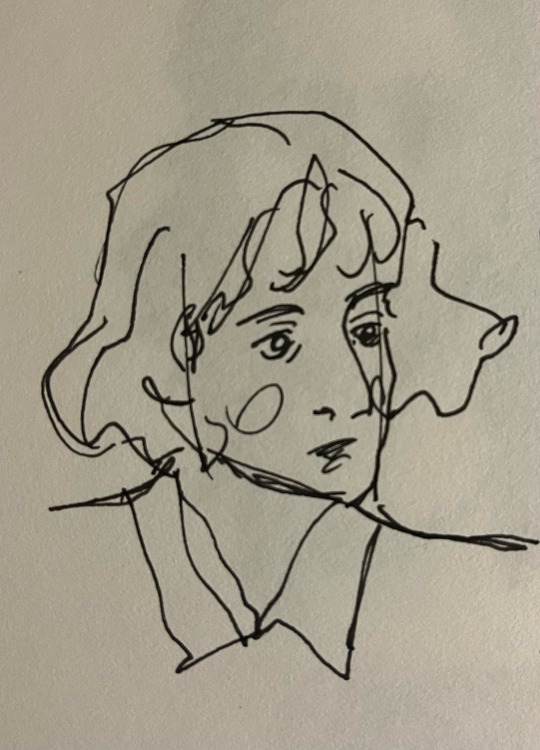
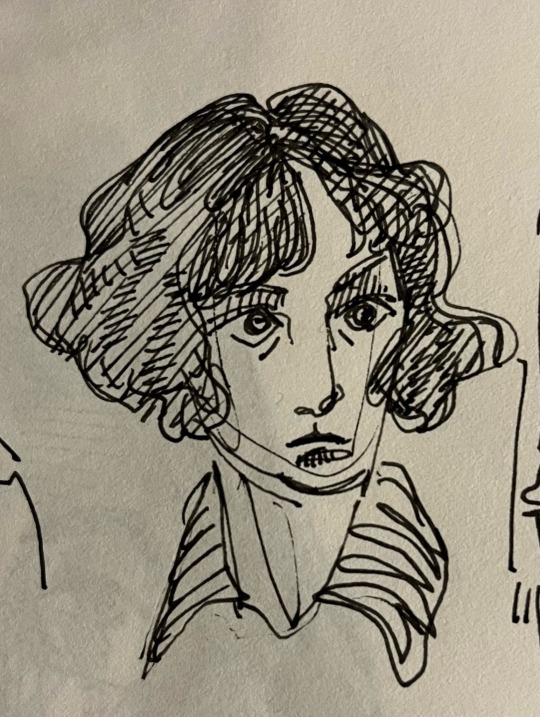
Harriet Walter as Harriet Vane my beloved
#harriet vane#lord peter wimsey#I don’t know how to tag the adaptation this is from#because the title is super vague#but it’s the 1987 tv adaptation#these sketches are from when I watched the Have His Carcase episodes#so I guess#have his carcase#dorothy sayers
198 notes
·
View notes
Text

This line goes so crazy hard that you’d think it’d be from Dorothy L. Sayers’ tenth Lord Peter Wimsey mystery ‘Gaudy Night’
And you’d be correct!
64 notes
·
View notes
Text
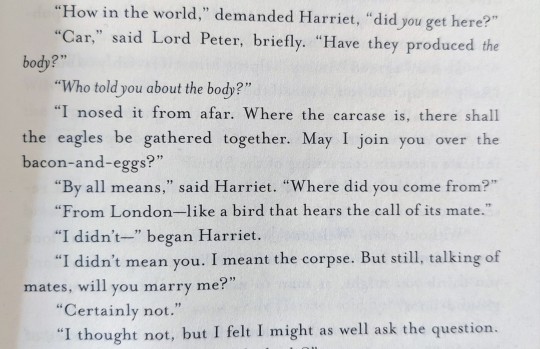
My favorite slow burn, novelist-and-the-amateur-detective-who's-crushing-hard-on-her to lovers, multi-novel relationship ever. And in the meantime, while they sort out their baggage, their weird friendship remains an absolute delight.
594 notes
·
View notes
Text
Harriet Vane: Peter, have you ever considered this?
Lord Peter Wimsey: What?
Harriet Vane: Harriet Vane, murder suspect.
Lord Peter Wimsey: oh, really!
Harriet Vane: No, listen. Personal characteristics: once tried for the murder of her lover, and acquitted by the skin of her teeth. Says she found Alexis death at 2.10 but can bring no evidence to prove that she did not see him alive. Took three hours to walk 4 and a half miles to inform the police. Is the sole witness to the finding of the razor, the time of the death, and the conditions of the flat iron. Was immediately suspected by Perkins and is probably still suspected by the police.
Lord Peter Wimsey: Nonsense, Harriet. I really...
Harriet Vane: who have been searching her room.
Lord Peter Wimsey: Have them, by Jove!
Harriet Vane: yes. Don't look like that. They couldn't very well do anything else, could they.
Lord peter Wimsey: I have something to say to Umplety.
Harriet Vane: No, you can spare me that.
Lord Peter Wimsey: But it is absurd!
Harriet Vane: It is not! Do you think I'm witless? Do you think I don't know why you came galloping down here at a five minutes notice? It was very nice of you and I should be grateful, but do you think I like it? You thought I was pretty brazen, I expect, when you found me getting publicity out of the thing. So I was. There's no choice for a person like me to be anything but brazen. I can't hide my name, it's what I live by. If I did hide it it would only be another suspicious circumstance, wouldn't it? But do you think it makes matters any more agreeable to know that it is only the patronage of Lord Peter Wimsey that prevent men like Umplety from being openly hostile?
Lord Peter Wimsey: I've been afraid of that.
Harriet Vane: Then why did you come?
Lord Peter Wimsey: So that you might not have to send for me.
Harriet Vane: Oh. Now, of course, everybody will say "look what he's doing for that woman, isn't it marvelous of him? I suppose every man thinks he's only to go on being superior, and any woman will come tumbling into his arms. It's disgusting.
Lord Peter Wimsey: Thank you. I may be everything you say, patronizing, interfering, conceited, intolerable and all the rest of it, but do give me credit for a little intelligence. Do you think I don't know all that? Do you think it is pleasant for any man who feels about a woman as I do about you to fight his way along under this detestable burden of gratitude? Damn it! Do you think I don't know perfectly well that I'd have a better chance if I was deaf, blind, maimed, starving, drunk or dissolute, so that you could have the fun of being magnanimous? Why do you think I treat my own sincerest feelings like something out of a comic opera if it isn't to save myself the bitter humiliation of seeing you try not to be utterly nauseated by them?
Harriet Vane: No, don't talk like that.
Lord Peter Wimsey: I wouldn't if you didn't force me to. And you might have the justice of remembering you can hurt me a damn side more than I can possibly hurt you.
Harriet Vane: I know I'm being horribly ungrateful.
Lord Peter Wimsey: Grateful! Good God am I never to get away from the bleat of that filthy adjective? I don't want gratitude! I don't want kindness! I don't want sentimentality! I don't even want love -I could make you give me that, of a sort-; I want common honesty.
Harriet Vane: Do you? But that's what I've always wanted. I don't think it is to be got.
Lord Peter Wimsey: Alright. I can respect that. Only you have got to play the game. Don't force an emotional situation and then blame me for it.
Harriet Vane: But I don't want any situation. I want to be left in peace.
Lord Peter Wimsey: But you are not a peaceful person.
Harriet Vane: Perhaps not, but all this is so dreary and exhausting.
Lord Peter Wimsey: Call me anything you like, but not dreary! Great Scott that I have been boring you interminably for 18 months on end! I know you once said that if anybody ever married me it would be for the sake of hearing me piffle on, but I expect that kind of thing pulls after a bit.
Harriet Vane: *laughs*
Lord Peter Wimsey: I'm babbling, I know I'm babbling, what on Earth am I to do about it?
Harriet Vane: oh, it's not fair, you always make me laugh. I can't fight, I'm so tired. You don't seem to know what being tired is. Stop. Let go. I won't be bullied, Peter, I won't be bullied! And now, if you'll excuse me, I have to make myself ready for an appointment.
Excuse me, I'll be right here stuffing my face into a pillow.
#Lord Peter Wimsey#this is from the radio drama btw#Harriet Vane#Have His Carcase#I'm going feral as the kids say
65 notes
·
View notes
Text
We don't talk enough about the Petherbridge/Walter adaptations of the Wimsey/Vane novels.
(Well, we probably talk EXACTLY enough about Gaudy Night, which is really pretty bad, but besides for that...)
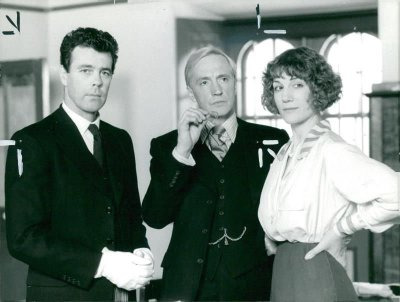
(Sorry, just a warning, Richard Morant as Bunter is fine but I won't have much to say about him here. I just really like this picture.)
The casting is basically perfect, especially Harriet Walter as Harriet Vane. I no longer see the book character in any other way- the only notable difference is that in the book she's noted as having a deep voice, but Walter's has a distinctive enough tone that I think it works regardless. She is just so, so, so good- captures the character beautifully, sells everything she does whether mundane or ridiculous (probably the best/most realistic reaction of someone finding a body I have EVER seen in Have His Carcase), makes the most of every limited minute she's on screen in Strong Poison and leaves her mark every minute that she isn't... and she looks AMAZING doing all of it. Just perfect, could not imagine better casting.
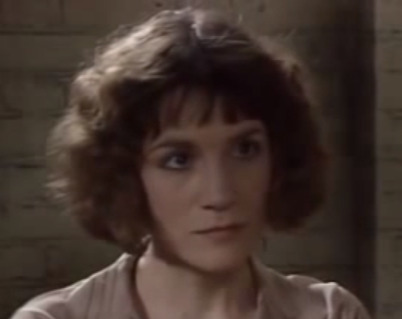
Edward Petherbridge I don't hold up to that level of perfection- I think that, try as he might, he's not really able to capture Wimsey's dynamism (possibly because he's a bit too old for the role) and is a bit overly caricatured in many of his mannerisms. But overall he does a pretty good job, in addition to looking quite a lot like how I'd imagined Wimsey- but in particular, I think he does a really lovely job of selling a lot of the emotion that he has to convey in some scenes that feel like they SHOULDN'T be adaptable from the book- specifically the scenes of him and Harriet. Him proposing to Harriet, him being disappointed when she (completely reasonably) turns him down... those shouldn't work on screen with real humans rather than in Sayers's calculated prose, but it DOES work and in no small part because he's great at selling Wimsey's feelings as being genuine even when his actions seem over the top. And, of course, Harriet Walter sells her end of the scenes right back. All in all, I think I have mixed feelings about Petherbridge as Lord Peter Wimsey the detective, but I'm a fan of him as Peter, the man who has feelings for Harriet.
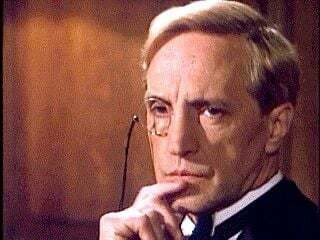
Overall, though, both are, I think, very successful in capturing these characters- the fact that they take these people who even in the book can sometimes push the boundaries of likeability (which to be clear, is part of what I love about reading them) and make them eminently watchable is a great achievement. And also, in addition to their really looking like their characters individually, they're very well matched as a pair in the way that one pictures them from the book. They're even of very similar height and build, which we know is canonically true from Gaudy Night, and thus at least a somewhat relevant element of their dynamic.
Now, the adaptations are very uneven, and that's even without talking about Gaudy Night because, while it has about as good a rendition of the punting scene as I think we were ever going to get, most of the rest of it is crap and massively expands on what I think are serious problems to Peter and Harriet's relationship that the series as a whole had (not to mention cutting the character of St George, which is a travesty). None of the adaptations are perfect, and mess with aspects of their relationship in negative ways- for example, the ending of Strong Poison is exactly backward in a really awful way. I'll get back to this.
But when the show gets the two of them right, it gets them RIGHT, even when it's adapting Sayers's text/creating new dialogue. There are scenes in this one that I love almost as much as the canon text, like this one:
I don't think any of this is in the book, and there are things that happen here that I don't think Sayers would have ever written. But at the same time, a combination of the dialogue and the actors makes it COMPLETELY believable as these two people, and it captures a moment that is just really key for Peter as he faces his limitations and his feelings- something that in the book is conveyed through a lot of internal narrative on Peter's part that would be impossible to adapt as is, but that in the world of the show needed to happen in a much more visual and narrative way. Not all of the dialogue that this series chooses to fill in those gaps works, but even when it doesn't the actors do their best to sell the heck out of it, and when the dialogue DOES work it is seriously brilliant.
Probably my favorite of the adaptations is Have His Carcase, and scenes like this one are a big part of the reason why:
They change the location, but otherwise it's EXTRAORDINARILY faithful to the equivalent scene in the book, and honestly it shouldn't have worked with real people doing it and yet it does. It's just acted perfectly, given just enough arch and silly humor (particularly with the spinning door) that we don't attempt to take it too seriously, while also conveying the relevant emotions so well. The actors in the scene through only their faces and ways of speaking convey subtext that Sayers, in the book, conveyed a lot later on as actual text in the characters' thoughts, and there's something pretty great about that.
Other Have His Carcase scenes are less good (the dance scene is mediocre at best, I think), but if there's another Have His Carcase scene that I think illustrates how great Walter and Petherbridge are at selling the human sides of their characters, it's That Argument- seen here:
The Argument is a pale imitation of that in the book- the one in the book is, in fact, probably unadaptable as is- but it is still just so good because the actors are so good at selling it. Walter is just brilliant in the role and utterly inhabits it while also imbuing it with her own spin, and makes us feel Harriet's pain- and Petherbridge, through some relatively subtle facial expressions and reactions, is able just as well to make US understand what all of this means to him and how he feels. It's actually really remarkable that, just like how Sayers writes a relationship dynamic that only feels like it works because she's the one who wrote it that very specific way, this scene feels like it only works because these two actors play it in this specific way. Could two other actors do it? Very possibly, but it would feel super different and I wonder if it would feel this authentic. (I do want to note though that this scene made me really wish that we'd seen a Frasier-era David Hyde Pierce in the role of a younger and spryer, but equally posh, witty, and vulnerable, Wimsey. It just gave me vibes of something that he'd do beautifully.)
Now, as I said above, this doesn't get EVERYTHING right. In fact, quite a lot of their relationship ends up going pretty wrong- as I think a major mistake is their throughline which emphasizes Peter's continued pursuit of Harriet as not just reiterating his interest to make it clear that he hasn't changed his mind, but actively taking advantage of moments and situations in a romantic sense, taking a much more specific role in engaging with her physically, commenting on her appearance, saying how difficult it is for him to NOT pursue her more, etc. It makes the whole thing feel a lot more cat-and-mouse rather than a budding relationship of equals, and one where Peter acknowledges the whole time that they HAVE to be equals for a) Harriet to feel comfortable with him and b) them to be good together. In fact, however good the Argument above is, it's kind of undercut by this very pattern- he makes the book's point about him treating his feelings like something out of a comic opera, but he also at that point in the story has had a few much more oppressively serious scenes with her that clearly make her uncomfortable- nothing like anything in a comic opera. It's like the show misses the point a little.
I think the place where this really starts is at the end of Strong Poison. (I could see an argument to be made that it starts earlier, in a few smaller nuances of their jailhouse scenes, but I like those enough that I choose not to read into them too much lol.) After what I think is a great addition to the final jailhouse scene (one that I loved so much I repurposed it for a fic)- "it's supposed to be about love, isn't it" and some excellent reactions from Petherbridge- Harriet goes to court, her charges are dismissed, and unlike in the book, when it's Wimsey who leaves first (which Eiluned and Sylvia point out is a sign of his decency in not waiting for Harriet to thank him), here Wimsey is the one who watches as Harriet rejects him and walks away from him- the beginning of the chase. But nothing about their relationship is meant to be a chase! It's so frustrating to watch as that proceeds to be a continuing issue to a limited degree in Have His Carcase (where it's at least balanced by enough good moments that it doesn't matter so much) and to a MASSIVE, genuinely uncomfortable degree in Gaudy Night.
The only praise I will give it is that while the punt scene in the book is unfilmable, I think this adaptation did its best here and it's pretty good.
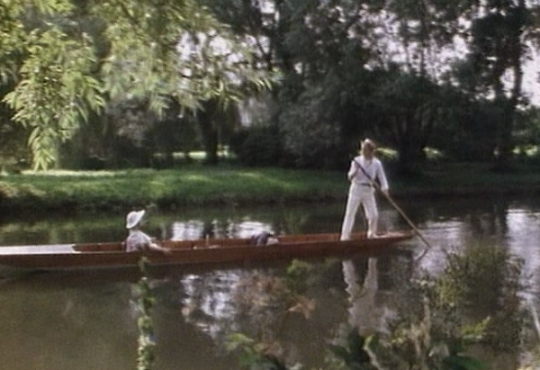
I'm not going to spend much time talking about Gaudy Night otherwise, because I'd need all day for it and also I'd probably need to rewatch it to make sure I get the details right and I have zero interest in doing that, but the way that it has Wimsey imposing himself and his feelings/hopes on Harriet to a really ridiculous degree, in a way that he never, ever does in the book, is just so so discomfiting and makes me feel terrible for Harriet. She doesn't deserve that. If I recall correctly, in that scene at the dance at the beginning, she's so happy just being with him and then he's all "oh so this means you want to marry me" and she just droops. He's so aggressive!
And that's what makes the worst part so bad, because not only does this miniseries not depict Wimsey's apology as the book does- one of the best scenes in a book full of brilliant scenes- it would actually be weird if it did, because this show doesn't imply that there's ANYTHING for Wimsey to be apologizing for! In fact, unlike in the books where we see Wimsey growing and deconstructing the parts of himself that had been demanding of Harriet, in the series we only see him get more demanding- until finally he wins. It's honestly infuriating and I hate it- the actors do their best to sell it (and apparently they were given bad enough material that they actually had to rewrite some of it themselves, though I have mixed feelings about the results) but it is just massively disappointing. Basically the whole emotional journey between the two of them is not just neutered but twisted.
For all of my criticisms of the adaptations' all around approach to their relationship, I do have to reiterate- Walter and Petherbridge do a wonderful, wonderful job. (Especially Walter.) When they're given good material to work with, and even often when they aren't, they are able to sell it so well- and particularly in the case of Walter, I genuinely can't think of the character as anyone but her rendition now. She IS Harriet Vane for me. And, for all the flaws that the series has, that's something pretty dang special.
Anyway, for anyone who read through this whole thing and hasn't seen these adaptations, I DO recommend Strong Poison and Have His Carcase- but not Gaudy Night unless you're either really curious or a glutton for punishment. The first two, though, have very good supporting casts, are quite faithful plot wise (sometimes to a fault- another flaw is that they are really devoted to conveying the whole mystery with all its clues sometimes to the point of dragginess, but will drop sideplots like, for example, Parker and Mary- which is totally reasonable, but still vaguely disappointing as those sideplots tend to add some levity/characterization), and just generally are an overall good time. (Some standout characters for me are Miss Climpson in Strong Poison and Mrs Lefranc in Have His Carcase.) And, of course, the best part is seeing the little snippets of Peter and Harriet that come through- less so their journey, vs in the book where that's central, but so many scenes where we just see the two of them together as they are in that moment and it's so satisfying.
#peter wimsey series#peter wimsey#lord peter wimsey#harriet vane#dorothy l sayers#edward petherbridge#harriet walter#a dorothy l sayers mystery#as was apparently the official title of the petherbridge/walter series#my thanks to the as my wimsey takes me podcast people#for a) coming back and finishing have his carcase#which was very enjoyable plane listening#but also for mentioning the adaptation in one of the episodes and inspiring the rewatch that led to this post#also this blog is basically now a sayers blog just as it is a finnemore one i guess#which as i note is fitting due to my Dog Collar Theory#which is YET ANOTHER THING THAT THE GAUDY NIGHT ADAPTATION LEAVES OUT GRRRRRR#strong poison#have his carcase#gaudy night
38 notes
·
View notes
Text
Lots of amazing takes on how Benoit Blanc met his husband/partner floating around, and I love all of them, but I’ve got to say my own personal headcanon is strongly influenced by Lord Peter Wimsey and Harriet Vane in their Strong Poison to Gaudy Night trajectory: Phillip/Hugh Grant’s character was accused of murder, and Benoit Blanc was on the case and the only one who believed he was innocent. The hurt/comfort potential alone would just be 🔥. Plus the internal battle for Benoit, always deeply upstanding, to try to keep his own growing feelings out of it long enough to make sure he is being objective in his investigations. I just—
#glass onion#glass onion spoilers#benoit blanc#benoit blanc’s husband#lord peter wimsey#harriet vane#strong poison#gaudy night#headcanons
224 notes
·
View notes
Text
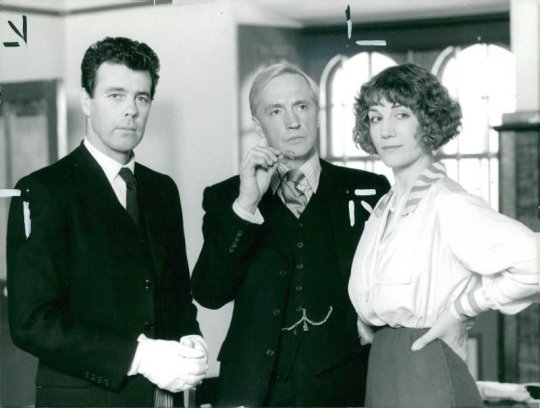
Really, really into all three of these people.
62 notes
·
View notes
Note
i'm reading all the peter wimsey novels because someone recommended gaudy night and that's how i work, and now i'm up to the nine tailors and just finished murder must advertise (my favorite so far), but i found it really hard to get through have his carcase, which was odd since i loved harriet vane so much in strong poison. even the characters seemed to bugger off at the end of have his carcase instead of tying up all the storylines and sayers seemed disengaged after the first act or two. i liked the parts with peter and harriet, even the two chapters that are 99% cipher, but everything else felt weak. did you enjoy this one/why or why not? do you have a favorite of the wimsey novels other than gaudy night?
I may be inducing a fight by saying this but I think Have His Carcase is one of Sayers' weakest novels, and certainly the weakest of those featuring Harriet Vane. I tried to re-read it recently and couldn't get very far into it, and I'm a huge fan of Sayers. I think it's also a necessary book in order to create a complete story for them -- but I don't know that it's necessary to read it in the modern era, and certainly not necessary to re-read it.
(My other picks for least enjoyable: Five Red Herrings and Nine Tailors, both of which are visibly her attempts to write like Agatha Christie, one of her literary heroes -- and they're not bad books, I just don't like Agatha Christie style "clockwork" mysteries, which tend to sacrifice personality to logistics. I suspect this may have impacted Carcase somewhat. We will come back to this.)
Gaudy Night is actually not my favorite overall -- I think it's one of her best, but Murder Must Advertise is my favorite and in fact the first one I read. Which is hilarious because Peter spends a significant amount of time Not Being Peter Wimsey in it, but it's just such a combination of things I love. Advertising (which Sayers worked in and which she also clearly loved writing about), secret identities, crime rings, a hint of romance, office gossip...
Anyway, Carcase. I think the problem is that to get from Strong Poison to Gaudy Night, there has to be a bridge, and it has to be kind of an unpleasant one, and thus you get Have His Carcase. One of the major points of Harriet's arc is that Sayers wanted to contravene the "damsel rescued by the hero" narrative. Not so much because she believed women should save themselves or not, but because she believed that a relationship based on that kind of inequality, where one partner was grateful (or was expected to be grateful eternally) for being saved, was inherently unhealthy and unsustainable, and it was also a super common narrative at the time she was writing. This reaction to the narrative is most visible in her unfinished novel Thrones, Dominations -- which was finished after her death by Jill Paton Walsh, and I'm not a huge fan of the end product, but I've seen the original manuscript held at Wheaton and it's evident that this was a theme before anyone else took over, it wasn't forced into the plot.
In any case, Sayers had to get Harriet and Peter from victim and rescuer to equal footing, and while Gaudy does a lot of lifting in that regard, it doesn't do enough on its own, there had to be a previous groundwork laid. In a sense I'm glad that the grappling they have to do, which is sensible and intelligently written but also really unromantic, was done in Have His Carcase, so that it doesn't intrude more than briefly into Gaudy Night. Carcase is a lot about Harriet setting boundaries and testing whether Peter will cross them, and Peter reacting (sometimes poorly) to someone challenging him in ways he's unaccustomed to being challenged. Carcase is two people finding out the worst parts of each other so they can work out that they love the reality of each other anyways, which is what they're doing in Gaudy. But we have to witness it in Carcase, which is unpleasant. At least for me.
As she matures as an author and gains more power over how she's published, you can see Sayers trying new things -- after Bellona (another fave) she gets very literary with Strong Poison, and then seems to swing between these kind of torturous attempts at Christie's style (Herrings, Tailors) and incredibly sensitive, emotionally delicate books like Murder Must Advertise and Gaudy Night. Carcase is a weird combination of the two, where she seems to be applying the dispassionate Christie style to a book that wants to be Gaudy Night but can't be.
Anyway, even her less enjoyable books can still be pretty fun, and it's worth it to have books like Murder Must Advertise and Strong Poison, and the thrilling romance of Gaudy Night. But yeah, Carcase is a bit of a slog to get through.
144 notes
·
View notes
Text
So inconsistencies in books are all right by me, I've read far too much Sherlock Holmes and Agatha Christie to really care if an author keeps the details of their works straight or not (the wobbly bits are where the headcanons and fanfics go :D).
Which is to establish that it's absolutely out of love that I find it absolutely hilarious that Harriet ages backwards between her first and second appearances.
Yeah, sorry to bother you Dorothy, but if she's 29 in 1930 she can't possibly be 28 in 1932*--
#(*assuming as is often done that the books are set when they were published)#(my point stands however)#lord peter wimsey#dorothy l sayers#harriet vane#sorry if you will never unsee this now--
21 notes
·
View notes
Text

Wimseyverse friends, the spirit of your posting came over me when I last entered a used book store. Although I had never consciously considered looking for this book, I knew that if the bookstore had it in stock, I would purchase it. And now, here we are.
#gaudy night#dorothy l. sayers#lord peter wimsey#harriet vane#wimseyverse#books#booklr#reading#bookish#bibliophile
28 notes
·
View notes
Text

-
OK, sorry, screenshotting this as not that closely related except in my brain and only in conversation with the tags, actually
I was thinking of how these two were raised with very specific roles in strongly class-based culture
And that both inescapability of that forming influence and yet compulsion to redefine it as the “crazy”
And Tolkien in conversation with the same changing mores and social structure as
Dorothy L. Sayers and the way Wimsey in Clouds of Witnesses is reflecting on noblesse oblige and also class vis a vis a dying nobility class in all the books??
And anyway Harriet Vane and Lord Peter Wimsey are Farawyn vibes to me in this exact way
#harriet also has primacy of arc in their series#though there’s more space for Peter in books that are almost primarily about their relationship#fandom#geekery#lord peter wimsey#harriet vane#dorothy l sayers#hectomache#liridi
15 notes
·
View notes
Text
The end of Strong Poison is so much to me. Like. Wimsey defending his sister and his friend to his snobbish brother, saying that Parker is just as good, if not better than any nobleman and how he makes her happy and he gets all snippy like “what next you’re going to marry a police woman” and Wimsey just grins and says “no, a prisoner” with no further explanation
Earlier in the story Harriet asks if Peter’s family will forget she had previous lovers, forget that she’s lower class and forget that she was arrested for murder and Peter says “of course, people forget things all the time” and she replies “then they’ll forget we are married” and it’s like
She doesn’t want them to forget. She doesn’t want to just become Peter’s little woman, she wants to keep hold of her identity, the good and the bad and Peter proclaiming her a prisoner to his brother shows that he listened and understood!! That he’s not going to try to change her and that he doesn’t want her to change at all, and in fact revels in the parts of her that others would want to change
#lord peter wimsey#harriet vane#this also could go into the reading that Harriet and Peter are both trans#strong poison#dorothy l sayers
44 notes
·
View notes
Text
"Harriet," he said, suddenly, "what do you think about life? I mean, do you find it good on the whole? Worth living?"
(He could, at any rate, trust her not to protest, archly: "That's a nice thing to ask on one's honeymoon!")
She turned to him with a quick readiness, as though here was the opportunity to say something she had been wanting to say for a long time:
"Yes! I've always felt absolutely certain it was good--if only one could get it straightened out. I've hated almost everything that ever happened to me, but I knew all the time it was just things that were wrong, not everything. Even when I felt most awful I never thought of killing myself or wanting to die--only of somehow getting out of the mess and starting again."
"That's rather admirable. With me it's always been the other way round. I can enjoy practically everything that comes along--while it's happening. Only I have to keep on doing things, because, if once I stop, it all seems a lot of rot and I don't care a damn if I go west tomorrow. At least, that's what I should have said. Now--I don't know. I'm beginning to think there may be something in it after all. . . "
Busman's Honeymoon
#the other thing i love is this is the page after Peter thinks that he doesn't care that his wife had sex with another guy before he met her#only that it's obvious to him that the sex was bad and this is very upsetting to him#and of course he makes sure to do it much better <3#favorite books#busman's honeymoon#dorothy l sayers#harriet vane#lord peter wimsey
29 notes
·
View notes
Quote
The black frock fitted her like a glove. It was made with the small square yoke and long, close sleeves, softened by a wrist-frill falling nearly to the knuckles. It outlined her figure to the waist and fell full- skirted to the ground, with a suggestion of the medieval robe. Its dull surface effaced itself not outshining the dull gleam of the academic poplin.
Yes, I want this dress, an urge I often feel when reading of fashion in fiction.
This one was described in 1936 by Dorothy L. Sayers in her novel Gaudy Night, a book in which Sayers made clear that she believed a woman of sense knew how to dress appropriately for every occasion. The occasion here was Gaudy Night when the alums of the women’s college set at Oxford University in England came back for a celebration. Her heroine, Harriet Vane, herself a writer of mysteries wears the dress. The dress is not only quietly magnificent, Vane also knows just how to wear it with the academic robe, the “academic poplin” mentioned, which she must wear over the dress, a tradition of the college.
Vane has come back as an alum and ends up trying to solve two mysteries: who is harassing the women of the college with threats and vandalism? and should she marry Lord Peter Wimsey, the impossibly charming, erudite and wealthy investigator who save her from a murder conviction? The answer to the second question seems obvious to me--yes, go marry the man!-- but Sayers takes just as long to explore the question of marriage for a woman with a professional career in 1936 as she does to uncover the mystery.
#Dorothy Sayers#harriet vane#lord peter wimsey#fashion in fiction#gaudy night#vintage evening dress#vintage fashion#1930s fashion#costume history#dress history#fashion history#academic fashion#oxford university#mystery novels#marriage
209 notes
·
View notes
Text
A friend of mine just made the mistake of telling me she's going to Oxford to do research at the Bodleian this summer- I sent her back a five minute long voicenote screaming about Sayers and Wimsey and Harriet Vane and have not heard from her since

Welp, at least she's not going to Cambridge- if she were I'd probably have found a way to attach an audio file of the full 28 minutes of Here's What We Do
#oxford#dorothy l sayers#wimsey#lord peter wimsey#harriet vane#gaudy night#john finnemore#here's what we do#jfda#john finnemore's double acts
9 notes
·
View notes